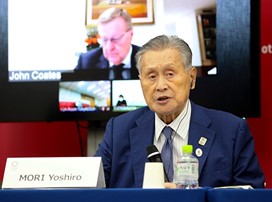Tokyo Olympics costs partially shaved, but by a pittance

(September 26, THE ASAHI SHIMBUN)
The International Olympic Committee and the Tokyo Organizing Committee of the Olympic and Paralympic Games reached a basic agreement Sept. 25 to partially offset the huge financial loss caused by the decision to postpone the event to next year.
The agreement covers 52 items of the sports extravaganza. The organizing committee will now calculate the expected savings.
Sources said the total would likely only amount to between 10 billion yen ($95 million) and 20 billion yen.
The sum is a pittance in comparison with the projected total cost of the Tokyo Olympics estimated as of the end of 2019 at 1.35 trillion yen. In addition, several hundreds of billions of yen will have to be paid due to the one-year postponement.
A key reason for not being able to make deeper cuts is that the number of sports in the Olympics and Paralympics as well as the 15,000 or so athletes expected to take part could not be touched.
The IOC and Tokyo organizing committee were on the same page about the need to cut costs from about late April soon after recently departed Prime Minister Shinzo Abe announced that the Tokyo Olympics would be postponed for a year due to the novel coronavirus pandemic.
According to sources, the two sides contributed a total of about 250 items where costs might be cut.
A “gold list” of the several dozens of items that would contribute the most in cost savings was drawn up as the two sides negotiated what could actually be simplified.
One area Tokyo organizing committee officials wanted to focus on was the “IOC royalty” that descends on a host Olympic city and expects to be wined and dined with no thought to costs.
As a result of the negotiations, the opening ceremony prior to the start of the IOC meeting in Tokyo that was originally scheduled for the National Theater in Tokyo’s Chiyoda Ward will be canceled.
Lounge as well as food and beverage services will also be scaled back.
“By cutting into the luxury outlays for IOC executives, we wanted to gain as much understanding as possible from Tokyo residents, the general public and corporate sponsors facing difficult times because of the COVID-19 pandemic,” said a high-ranking organizing committee member.
Agreement was also reached on reducing the number of officials from other national Olympic committees and sports organizations coming to Japan. While about 50,000 or so officials were initially expected to come for the Olympics, the number will be cut by 10 to 15 percent.
Despite the new agreed terms, an organizing committee official conceded there was little in the way of major reductions that could be used to convince the public that serious efforts were being made to cut expenditures.
One area that the organizing committee could not touch was the Olympic torch relay around all 47 prefectures.
Shortening the relay route would undoubtedly anger municipalities that suddenly found themselves cut out of the event after so much planning.
About the only thing that could be done was to reduce the number of motor vehicles in the caravan accompanying the Olympic torch.
An effort to shorten the Opening and Closing Ceremony also got nowhere, although agreement was reached to make the productions of both events less flashy.
One source said IOC officials indicated that cutting those ceremonies would not go over well with the TV broadcaster holding the rights to the Olympics.
A plan to shorten the amount of time the athletes’ village stays open was also rejected because doing so would have meant heavy congestion among athletes over the shorter period, which could complicate efforts to prevent a spread of new coronavirus cases.
But agreement was reached to do away with the ceremony for each nation welcoming its athletes to the village as well as distributing souvenirs to those groups.



